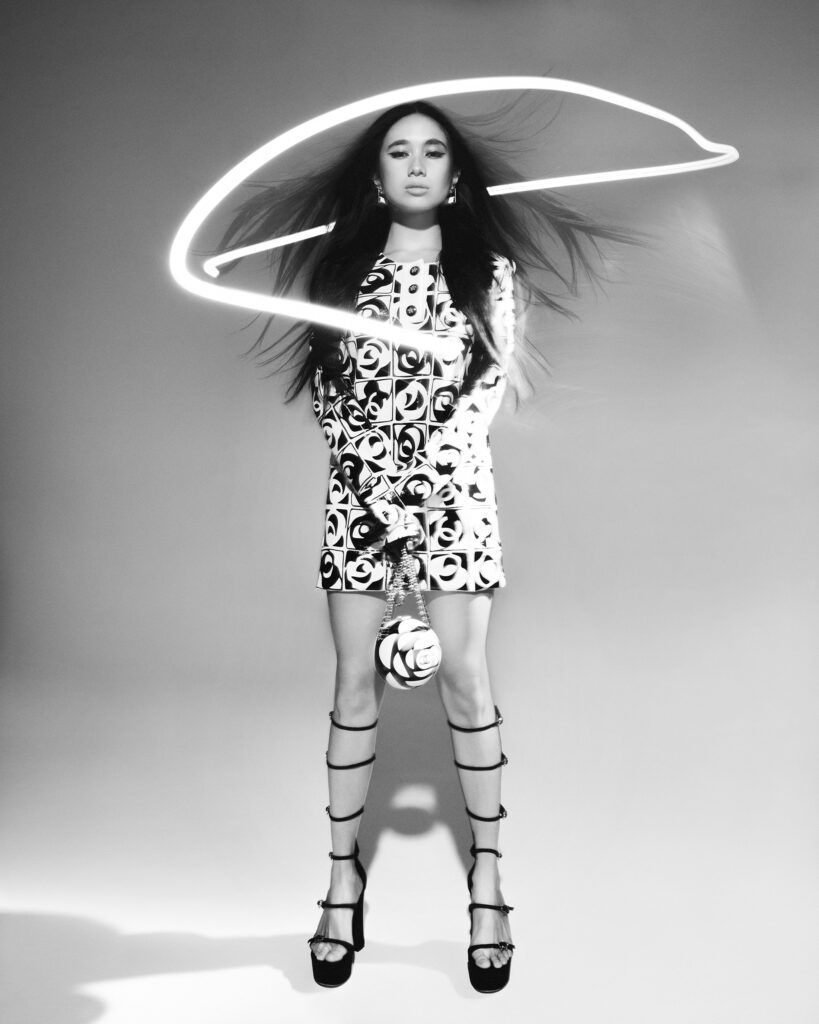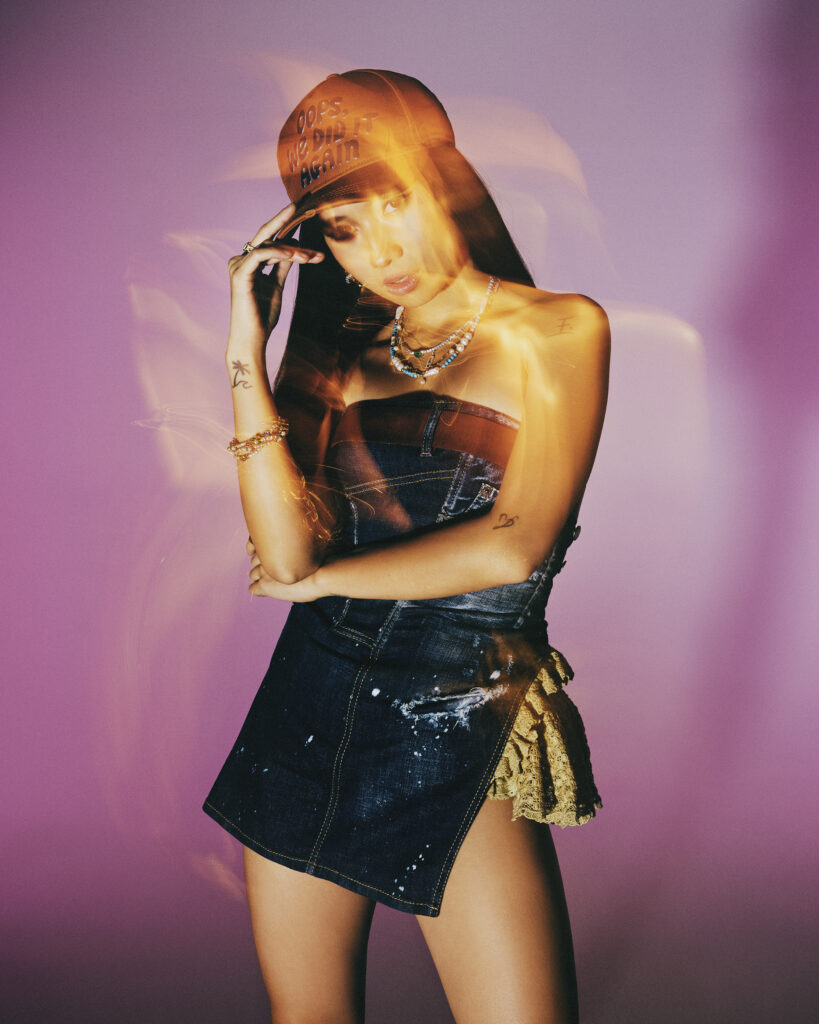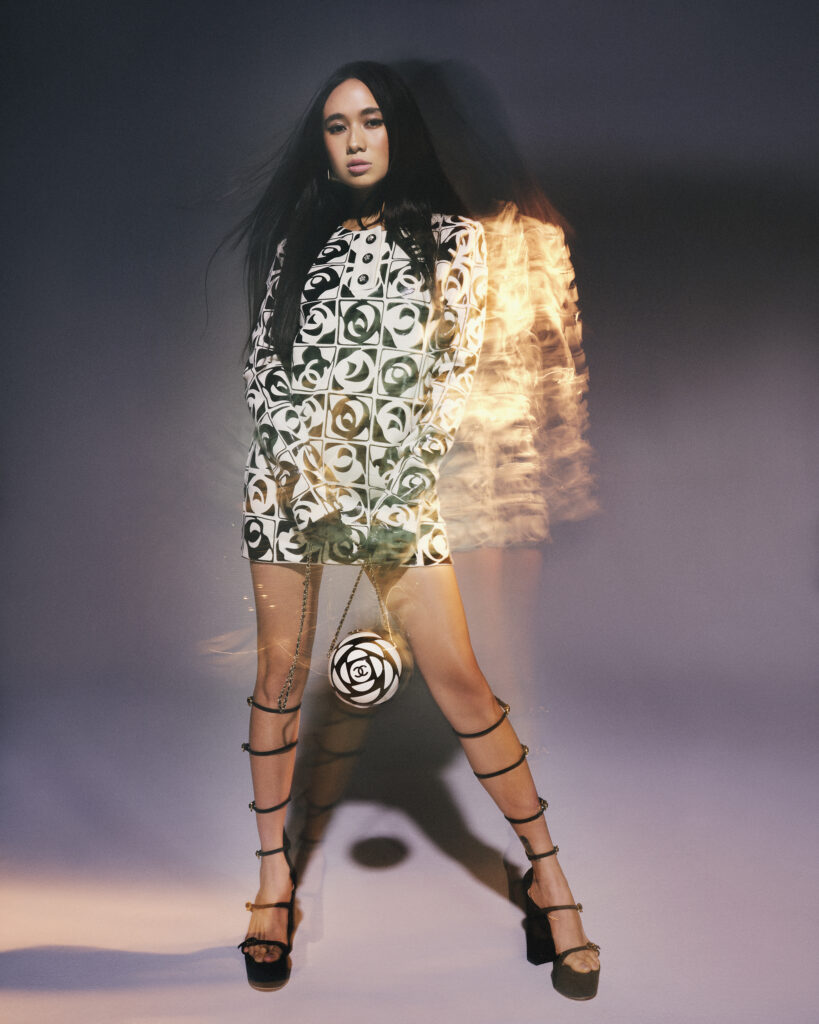NIKI knows it’s never too late to reinvent herself. For the Jakarta-born, LA-based artist, now is always the right time. At just 24 years young, NIKI has already lived through as many reinventions as a seasoned pop star with more than a decade of experience under her belt.
Chapter One: Nicole Zefanya—a pop-loving, raven-haired teen who won the competition of a lifetime to perform on stage alongside her musical hero, Taylor Swift. Not too shabby a prize for the then-burgeoning musician.

Cut to chapter two: nzee24, the Gen Z classic tale of a vision for stardom and a video camera. nzee24 captured the ears—and clicks—of millions as the 15-year-old strummed an acoustic guitar to the melodic tunes of John Mayer, Ed Sheeran, and, of course, Nicole Zefanya. “I taught myself three chords off of YouTube and the rest was history,” NIKI reflects. “I always had an affinity for writing and language in general. When I got my guitar, that married my two loves of language and music.”
Her lush vocals racked up subscribers along the way and she quickly garnered a dedicated following for her indie folk musings. The high school student showcased lyricism beyond her years, weaving her English-lit vocabulary into tales of adolescent heartbreak between homework sessions. But as she passed through her high school hallways for the final time, nzee24’s channel went dark. Behind the scenes, she was masterminding her latest move—record deal secured, global stardom pending.

Thus, the birth of NIKI. Her return to the screen came with a polished new look and a mature R&B sound. “I put down the guitar and traded it for synthesizers and production. I wanted to challenge myself and see if I could genre hop for no reason other than just seeing if I could do it.”
Chapter three: a musical renaissance. Alongside 88rising music executive Sean Miyashiro, the songstress finely tuned a sound and image far from her humble folk beginnings. Stylized in all caps, NIKI made it clear she is not just appearing on the scene, but that she is the scene. Her debut album, Moonchild, stirred up a media superstorm thanks to its effortless groove and concept. Crowned with a 2021 TikTok viral anthem “Every Summertime,” NIKI crafted a killer follow-up with her sophomore album, Nicole, which edged back toward alt-pop melodies and storytelling.

Now, NIKI is evolving into her next chapter with a return to her indie roots. The singer-songwriter is circling back to the sounds that kicked off her headlining career and transitioning back to a more acoustic sound. Most recently, NIKI took over Los Angeles’ Wiltern Theatre, playing to sold-out crowds. Live at The Wiltern offers a stripped-down take on the pop princess’s vocals, capturing energetic fanfare and honeyed harmonies. “It’s funny how life happens and you find yourself right back to the beginning. You try to run really far away from yourself and then realize that that doesn’t work, I guess,” she says. In the next chapter of NIKI, the artist? Stay tuned.
V MAGAZINE: Take me back to your roots. I understand that growing up your mom sang back up in a church gospel. Would you say you grew up in a very musical home or where were these musical talents honed?
NIKI: Music has always definitely been something very, very familiar to me. As soon as I was born, I was exposed to music. Even before I was born—my mom sang while she was pregnant with me. All of my aunties and uncles from church would come over on Saturdays to our house to practice for Sunday service and there was a lot of guitar, bass and piano playing at the house. Everybody would just erupt in song and harmony. That was my life for a long time.
I didn’t realize I, myself, was very musical until I was nine when my mom finally bought me my first guitar and I started strumming. I taught myself three chords off of YouTube and then after that, the rest was history. I saw an E! True Hollywood documentary on Taylor Swift and how she wrote songs when she was around my then-age. I was like, “Oh wait, I could do that.” Literally the next day, I wrote my first song as a nine year old. It wasn’t very good but, you know, I tried.
V: I love that. Were you always a writer? How did you progress into writing music and sharing it online with the world?
NIKI: I always loved English. I also grew up in Jakarta, Indonesia, so when going to school, there were two language classes—English and Indonesian. I definitely always had an affinity for writing and language in general. When I got my guitar, that married my two loves of language and music. My big draw to music has always been lyrics—it’s the first thing I notice. I’ve always been a lyricist at heart. I was really drawn to indie and folk and how it’s usually very raw, real and sometimes there’s lots of imagery. You can convey an emotion through a metaphor.
It was like a musical renaissance for me because I had grown up listening to a lot of R&B and Gospel. Once I discovered YouTube, I discovered other genres and it encouraged me to start writing my own songs. On YouTube back then, there was a really small community of singer-songwriters from all over the world posting their originals and covers. That community also inspired me to start my own channel and it was my only outlet growing up to put out music and express myself in that way.
V: As you progressed in your career and you signed with 88rising, I noticed your sound transitioned from Indie into R&B. Was that on purpose or a natural progression?
NIKI: You know, I was young—17 or 18. Growing up, I always had two loves in music and it was R&B and indie folk. In my head, they seemed so dichotomous for a long time. I also think when you’re 17, you’re coupled with a lot of angst and wanting to rebrand in general—you’ve just graduated high school, it’s like a fresh start. I put down the guitar and traded it for synthesizers and production. I wanted to challenge myself and see if I could genre hop for no reason other than just seeing if I could do it.
I started experimenting with that and then I became friends with Rich Brian, who’s my label mate and also an artist at 88rising. We’re both Indonesian and honestly at that time, he was one of my only musical peers. At that point, I had been sending him demos back and forth and he would send me demos and we would tell each other our opinions.
At one point, I had sent him a demo that he ended up really liking so much to the point where he was like, “Yo, can I produce over this?”. He was already signed to 88rising and he showed it to Sean, our manager, and also the CEO of 88rising. He heard it and asked to Skype with me. He was still trying to sign new artists. I remember that Skype. Then before you know it, NIKI was born. I don’t regret it at all—I actually think the start of my career is kind of cool! I was definitely young, trying things out and finding my sound. Now I’ve arrived at a place that’s further away from where I started as NIKI.
V: How so?
NIKI: Through the pandemic, I audited my discography and drafts that I’ve had for years and realized that my heart is very much in the kind of music that I used to put up on YouTube—the very thing that I feel like I was running from at the beginning of my career. It’s funny how life happens and then you sort of find yourself right back to the beginning. You try to run really far away from yourself and then realize that that doesn’t work, I guess. I definitely pivoted with my sophomore record, Nicole. That was like a revisit to the YouTube days. I’ve put out two albums at this point, but I would say Nicole is definitely more of my heart record and Moonchild is definitely very meaningful to me but more experimental. Me trying to figure out my sound.
V: Absolutely. It sounds like a very organic progression. Something that stood out to me is how you’ve reinvented yourself so many times over, from the teenage song covers on YouTube and then NIKI in R&B, and even now going more towards the indie sound again. What is it about reinvention that excites you or inspires you?
NIKI: That’s a really good question. I don’t know if I’ve ever been asked that. I guess maybe I am a little bit addicted to reinventing myself. I don’t know if it’s so much as reinventing myself as much as it is just exploring every facet of myself because I feel like I’m many things but you can only show so much of yourself to the public and to my audience. With the trajectory of my career and even now, I don’t know if I’ve fully settled on one kind of sound.
I’m sure this is a feeling a lot of artists feel, but I really struggle to box myself in and label myself as “I’m this type of artist”.As I grow older, the source of my inspiration tends to change over time and evolve. I am very, very fortunate and lucky to be at a label like 88rising where they really welcome that sense of exploration—I know that’s definitely not always the case for a lot of other artists. They have definitely allowed me to foster and cultivate my own creativity and have been my absolute champions as I do so. I don’t think my personal journey as an artist is the bog standard experience that a lot of other artists go through, but I am very, very grateful that for example, my two albums don’t sound anything like one another. My fans will always be getting a different taste of me, as long as I can keep being inspired by different things.
V: Speaking of reinvention, you’re gearing up for the release of the next live album. What’s the next era of NIKI that we can expect to see?
NIKI: I think this is the first time in my life where I’m not heartbroken anymore which is awesome. Now there’s the challenge of “well, what do I write about now?”. I have this inclination to write about sad stuff all the time. I think it was Phoebe Bridgers who said that “any good lyric is inherently sad”. Obviously that’s her opinion, but I actually completely agree. We’ll see where this takes me, I’m also very curious. I’ve really missed playing instruments on stage like I did on my last two tours. For this next record, I’m looking at it through the lens of how it would sound live and how I would play it live which I had honestly never really thought about before. That’s really exciting.
V: Going into this new era of creating during your first era of not being heartbroken, do you have any mantras or mottos you are going forward with?
NIKI: That’s a really good one. This is really corny, but I heard a couple years ago, “love begets love” and it’s very corny but I love it. It essentially means “love just grows” and I think that’s something that in my twenties, I’m only now beginning to understand. There’s just so much love to go around. Love isn’t something that remains stagnant, it has many forms and evolves over time. Also, just because you love one thing, doesn’t mean you can’t love a lot of other things, essentially. The more you love, the more love you get back.
This feature appears inside the pages of V143: now available for purchase!
Photography Dennis Leupold
Fashion Matthew Mazur
Makeup Lilly Keys (A-Frame)
Hair Clayton Hawkins (The Visionaries)
Production Vanessa Vossen (Art Department)
Digital Technician Kevin Leupold
Editorial Direction & Casting Czar Van Gaal
Editor Kala Herh
Photo assistant Marco Bravo, Allison Lopez
Stylist assistant Nia Shambourger
Makeup assistant Elaina Karras
Hair assistants Sydney Staehle
Retouching Venus PP
Location Dust Studios
Discover More




